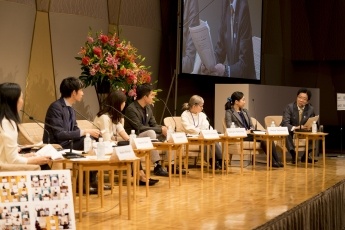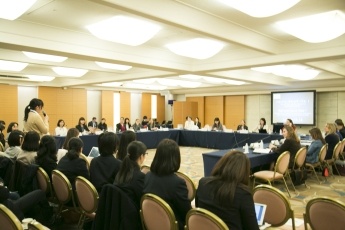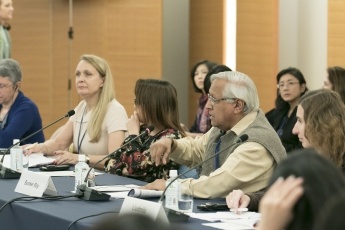Women's Empowerment and Gender Equality
World Assembly for Women: WAW! 2016 High-Level Round Table
December 14, 2016



1 On December 14, high-level round tables of World Assembly for Women (WAW! 2016) were held at Grand Prince Hotel New Takanawa, and Mr. Katsunobu Kato, Minister in Charge of Women's Empowerment and Minister of State for Gender Equality, Mr. Koichi Hagiuda, Deputy Chief Cabinet Secretary, Mrs. Akie Abe, Spouse of Prime Minister and others attended.
2 In opening session, Minister Kato touched upon his passion that he has had since the time when he led the 1st and 2nd WAW! as Deputy Chief Cabinet Secretary, and presented concrete actions for reforming working-style which he is in charge as a minister,
such as efforts to address long working hours, to realize equal pay for equal work, and to make the environment in which women can play an active role. He also introduced the visualization of information regarding women's active engagement in public and private sectors under the the Act on Promotion of Women's Participation and Advancement in the Workplace, which was fully enforced in April 2016, and the initiative to add evaluation points, as incentives, on companies promoting work-life balance in the government procurements, and he explained the progress in women's active engagement in Japan. In addition, on Japanese efforts at international community, he mentioned about discussion and outcomes on women issues at Ise-Shima Summit, the first summit after SDGs was launched, and at related ministers' meetings. In light of "Development Strategy for Gender Equality and Women's Empowerment" which was released before the Ise-Shima Summit, he also stated that Japan will continue to contribute to women's active engagement including promotion of SDGs in the international community.
3 Ms. Helen Clark, the administrator of UNDP (United Nations Development Programme), introduced current situation and challenges of SDGs' goal concerning women such as challenge in women's participation and leadership not only at companies but also in the field of politics and administration, hardship in women's employment including unpaid work, current situation of violence against women, women's sexual and reproductive health and rights etc, and she called for strengthening active actions to realize SDGs. Ms. Fumiko Hayashi, mayor of Yokohama city of Japan, introduced concrete examples of efforts such as transformation of mindset among staff/employees and their capacity development based on her experience as a mayor and also as the first female CEO in four companies, and emphasized the importance of active leadership in such efforts.
4 Five high-level round tables on "Developing Capacity of Women and Promoting Their Active Roles in Science, Technology, Engineering and Mathematics (STEM)", "Promoting Women's Leadership", "Work-Life Management 2.0", "Women's Well-being -Especially Improving Sexual and Reproductive Health and Rights-" and "Participation and Empowerment of Women in Peace and Security" were held in the morning and afternoon for 3 hours in total. Special session in the morning focused on youth, while afternoon session was about innovation from local communities. Recommendations from each session are as follows.
(1)Developing Capacity of Women and Promoting Their Active Roles in Science, Technology, Engineering and Mathematics (STEM)
6 On the closing session, Minister Dorji Choden, Minister for Works and Human Settlement of Bhutan, and Mr. Raimo Parssinen, Member of Parliament in Sweden, made remarks respectively. Ms. Dorji Choden mentioned that women's promotion is not for competing against men, but building equal partnership, and that perspective is crucial in terms of development. At the same time, she also stressed the importance to enforce women's health and women's promotion in both public and private sectors with emphasizing the importance of raising awareness as discussed throughout WAW! Mr. Raimo Parssinen stated the importance of sharing perspectives in the international community that gender equality is indispensable for economic growth and prosperity by introducing efforts and achievement of Sweden's efforts in gender equality in the political sphere. Then, rapporteurs from five high-level round tables and 2 special sessions presented discussion summary with suggestions. Lastly, Mr. Kimihiro Ishikane, Deputy Vice-Minister for Foreign Policy summarized whole discussion or WAW! and asked participants share many suggestions at WAW! 2016 in their home country and their own organizations and make further action together with Japan.
2 In opening session, Minister Kato touched upon his passion that he has had since the time when he led the 1st and 2nd WAW! as Deputy Chief Cabinet Secretary, and presented concrete actions for reforming working-style which he is in charge as a minister,
such as efforts to address long working hours, to realize equal pay for equal work, and to make the environment in which women can play an active role. He also introduced the visualization of information regarding women's active engagement in public and private sectors under the the Act on Promotion of Women's Participation and Advancement in the Workplace, which was fully enforced in April 2016, and the initiative to add evaluation points, as incentives, on companies promoting work-life balance in the government procurements, and he explained the progress in women's active engagement in Japan. In addition, on Japanese efforts at international community, he mentioned about discussion and outcomes on women issues at Ise-Shima Summit, the first summit after SDGs was launched, and at related ministers' meetings. In light of "Development Strategy for Gender Equality and Women's Empowerment" which was released before the Ise-Shima Summit, he also stated that Japan will continue to contribute to women's active engagement including promotion of SDGs in the international community.
3 Ms. Helen Clark, the administrator of UNDP (United Nations Development Programme), introduced current situation and challenges of SDGs' goal concerning women such as challenge in women's participation and leadership not only at companies but also in the field of politics and administration, hardship in women's employment including unpaid work, current situation of violence against women, women's sexual and reproductive health and rights etc, and she called for strengthening active actions to realize SDGs. Ms. Fumiko Hayashi, mayor of Yokohama city of Japan, introduced concrete examples of efforts such as transformation of mindset among staff/employees and their capacity development based on her experience as a mayor and also as the first female CEO in four companies, and emphasized the importance of active leadership in such efforts.
4 Five high-level round tables on "Developing Capacity of Women and Promoting Their Active Roles in Science, Technology, Engineering and Mathematics (STEM)", "Promoting Women's Leadership", "Work-Life Management 2.0", "Women's Well-being -Especially Improving Sexual and Reproductive Health and Rights-" and "Participation and Empowerment of Women in Peace and Security" were held in the morning and afternoon for 3 hours in total. Special session in the morning focused on youth, while afternoon session was about innovation from local communities. Recommendations from each session are as follows.
(1)Developing Capacity of Women and Promoting Their Active Roles in Science, Technology, Engineering and Mathematics (STEM)
- In order to promote more women's engagement in STEM field, remove gender stereotype of education and professions together with media, teachers and parents early in childhood by presenting various influencers and role model.
- Disseminate the story about women playing active role and visualize the needs of industry.
- Develop capacity of women and support continuous employment of women according to life stage of women.
- Strengthen cooperation among industry-academia-government nationally and internationally and increase the momentum of the above efforts.
- Organization should commit to promote women's active engagement with transparency. Visualization of their commitment and progress by setting concrete numerical target, vision and plan are the key to success.
- Identify the role model of women who manage companies, and offer the opportunity for capacity development of women through providing training program to increase female candidates for managers and executives.
- Offer incentives to the companies that promote active engagement of women by the efforts such as giving favorable treatment in the system of tax and procurement and giving award to them.
- Leaders introduce flexible working-style and be the first to practice it. Ensure transparency with data when evaluating the performance of employees.
- Change the division of traditional male-female roles through the efforts such as dissemination of role model, fulfilling mentor and support system, and use of media and data.
- Expand child-care leave system and short working hour system for child-care, make mandatory to have preventive measure for harassment against pregnancy, delivery, and nursing at work place, and support continuous employment of women. Note that promotion of telework using ICT is also critical to promote these efforts.
- Based on the understanding that well-being of mother and child is good not only for themselves but also for their whole family and community, ensure sexual and reproductive health and strengthen the efforts to address infectious diseases and malnutrition.
- Manage and share data, in addition to best practice.
- Change comprehensive sex education and social norms with the participation of adolescent.
- Improve the access to sexual and reproductive health service which is also related to universal health coverage.
- Utilize the power of experienced and knowledgeable women who understand the needs of women and girls under conflict and post natural disaster.
- For the purpose above, note the importance of encouraging other countries to make National Action Plan on Women, Peace and Security and to offer leadership training for women. Especially, increase the sensitivity of women in peace keeping operations and develop women's ability and confidence as mediators.
- Not only women but also men have to contribute to the gender equality.
- Establish a system to practically and constantly reflect voices of young people into policy.
- Abolish discriminatory laws based on against gender.
- Need to change mindset in local communities and social norm in order to build environment in which women truly shine. Acquire skills and collaborate with others where gender, age and regional discrimination remains.
- Make sure that women obtain decision-making power through incorporating new perspectives by utilizing outsider power or introducing new technology such as ICT.
6 On the closing session, Minister Dorji Choden, Minister for Works and Human Settlement of Bhutan, and Mr. Raimo Parssinen, Member of Parliament in Sweden, made remarks respectively. Ms. Dorji Choden mentioned that women's promotion is not for competing against men, but building equal partnership, and that perspective is crucial in terms of development. At the same time, she also stressed the importance to enforce women's health and women's promotion in both public and private sectors with emphasizing the importance of raising awareness as discussed throughout WAW! Mr. Raimo Parssinen stated the importance of sharing perspectives in the international community that gender equality is indispensable for economic growth and prosperity by introducing efforts and achievement of Sweden's efforts in gender equality in the political sphere. Then, rapporteurs from five high-level round tables and 2 special sessions presented discussion summary with suggestions. Lastly, Mr. Kimihiro Ishikane, Deputy Vice-Minister for Foreign Policy summarized whole discussion or WAW! and asked participants share many suggestions at WAW! 2016 in their home country and their own organizations and make further action together with Japan.

